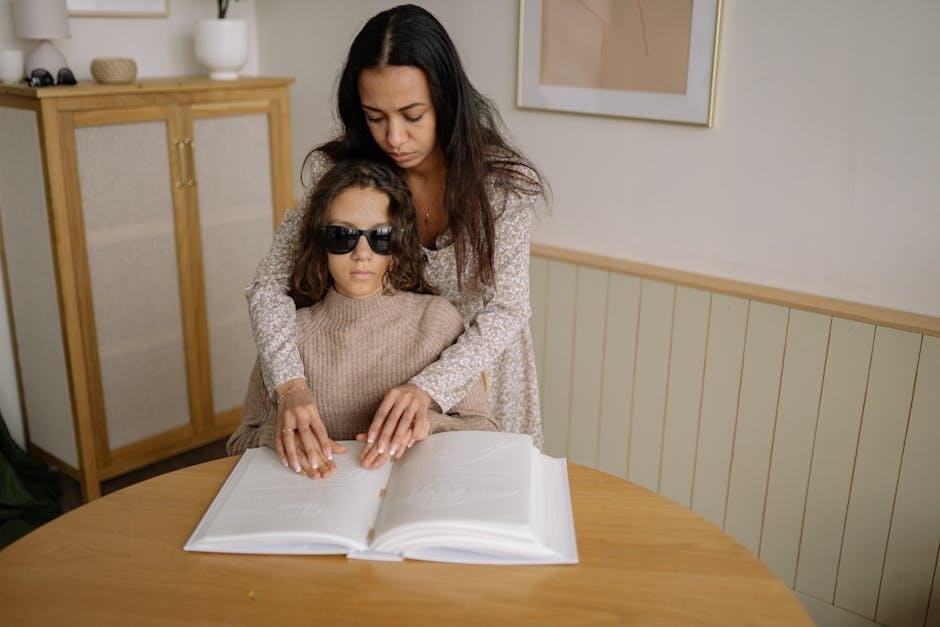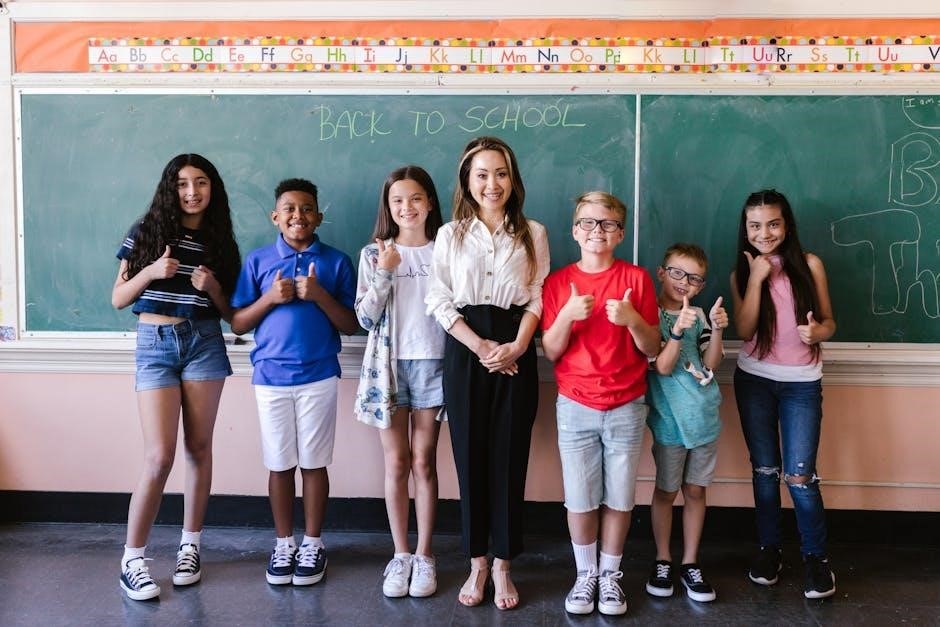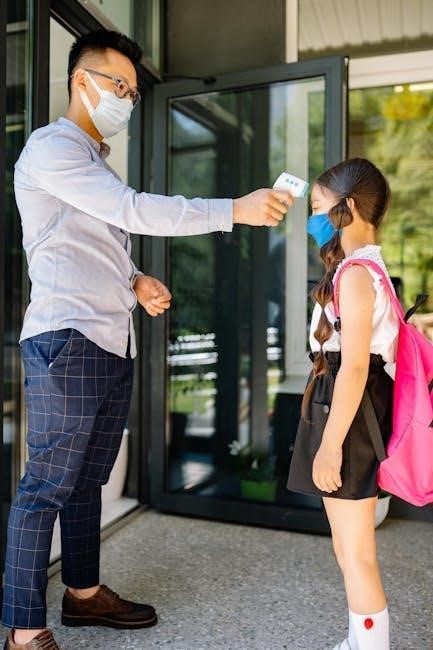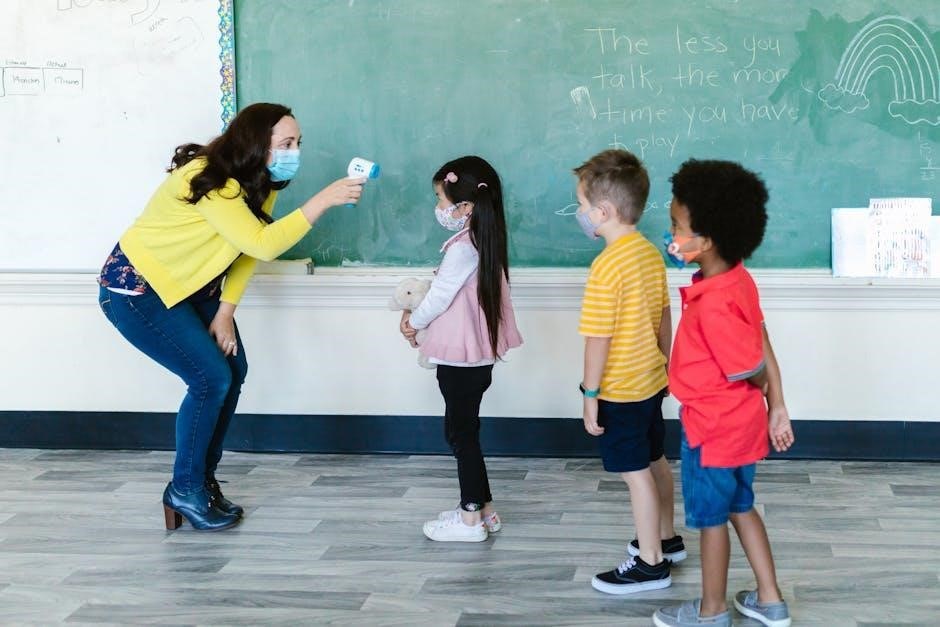roles and responsibilities of a special education teacher pdf

Special education teachers are dedicated professionals who empower students with diverse needs through personalized learning and support, fostering academic, social, and emotional growth in collaboration with families and other educators, ensuring each student reaches their full potential․
Overview of Special Education
Special education refers to tailored educational services designed to meet the unique needs of students with disabilities, learning difficulties, or exceptional abilities․ It focuses on creating an inclusive and supportive learning environment that addresses diverse challenges, ensuring equal access to education for all․ Special education programs are often customized to individual student needs, incorporating strategies that promote academic, social, and emotional development․
These programs serve students with a wide range of needs, including physical, cognitive, emotional, and sensory disabilities․ The foundation of special education lies in understanding each student’s strengths and challenges, providing appropriate accommodations, and fostering collaboration between teachers, families, and other professionals to support student success․
Importance of Special Education Teachers
Special education teachers play a transformative role in shaping the lives of students with diverse needs․ They provide specialized instruction, support, and advocacy, ensuring that every student has the opportunity to learn and grow․ These educators are essential in fostering inclusive learning environments and addressing the unique challenges faced by students with disabilities or special needs․
Their expertise in adapting curricula and implementing individualized strategies helps bridge learning gaps and promote academic and personal development․ By empowering students to overcome barriers, special education teachers not only enhance their educational outcomes but also contribute to their social and emotional well-being․ Their dedication and impact are vital in creating a more equitable and compassionate education system․

Key Roles of a Special Education Teacher
Special education teachers design tailored learning plans, deliver specialized instruction, and use adaptive strategies to meet diverse student needs, fostering inclusive and supportive educational environments․
Instructional Responsibilities
Special education teachers are responsible for creating and implementing individualized learning plans tailored to each student’s unique needs․ They adapt general education curricula to ensure accessibility and engagement, using specialized instructional techniques and assistive technologies․ Assessing student progress and adjusting teaching strategies are critical components of their role; Additionally, they collaborate with general education teachers to support inclusive learning environments․ Monitoring academic and behavioral progress, they provide targeted interventions to address skill gaps․ Their instructional responsibilities also include fostering a positive and structured classroom environment that promotes social, emotional, and academic growth․ By leveraging diverse teaching methods, they empower students with disabilities to achieve their educational goals effectively․

Emotional and Behavioral Support
Special education teachers play a vital role in providing emotional and behavioral support to students with diverse needs․ They create a safe and inclusive classroom environment that encourages social-emotional learning and well-being․ Teachers assess students’ emotional and behavioral challenges, developing strategies to address these issues․ They implement positive behavioral interventions and support plans tailored to individual needs․ Additionally, they foster self-awareness, self-regulation, and resilience in students․ Collaboration with families and mental health professionals is essential to ensure consistency in support; By addressing emotional and behavioral needs, special education teachers help students build confidence and develop skills necessary for long-term success․ This support is integral to students’ overall development and academic progress․
Collaboration with Other Professionals
Special education teachers collaborate with various professionals to ensure comprehensive support for students with special needs․ This includes working with general education teachers, school administrators, therapists, school counselors, and psychologists․ They also engage with families to align educational goals with home environments․ Collaboration involves team meetings, co-teaching, and sharing resources to provide tailored support․ Effective communication among all parties is crucial for consistent and aligned strategies․ This teamwork enhances academic and social outcomes for students while fostering a supportive educational environment․ By working together, professionals can address diverse needs effectively, ensuring each student’s success and well-being․ Collaboration is essential for creating an inclusive and supportive educational setting․ It promotes shared responsibility and maximizes the impact of educational efforts․ Through teamwork, special education teachers ensure that students receive the multifaceted support they need to thrive․
Core Responsibilities of a Special Education Teacher
Special education teachers create individualized plans, support diverse needs, and foster inclusive learning environments to ensure each student’s educational and personal growth effectively․
Developing Individualized Education Programs (IEPs)
Special education teachers play a vital role in creating and implementing Individualized Education Programs (IEPs)․ An IEP is a tailored plan designed to meet the unique needs of each student with a disability․ Teachers collaborate with parents, administrators, and other professionals to assess the student’s strengths, challenges, and learning goals․ They draft clear, measurable objectives and outline the services and accommodations required to support the student’s progress․ Regular monitoring and updates ensure the IEP remains relevant and effective․ This process not only ensures legal compliance but also fosters a personalized learning environment that empowers students to achieve their full potential academically, socially, and emotionally․
Assessing Student Needs and Progress
Special education teachers are responsible for continuously assessing students’ needs and progress to ensure effective instruction․ This involves using a variety of tools, such as standardized tests, informal observations, and progress monitoring․ By identifying learning gaps and strengths, teachers can tailor instruction to meet individual needs․ Assessments also help measure progress toward IEP goals, providing valuable data to inform instruction․ Teachers collaborate with other professionals and parents to interpret results and adjust strategies․ Regular evaluations ensure students receive appropriate support and accommodations, fostering academic and personal growth․ This process is essential for meeting the diverse needs of students and ensuring they achieve their full potential in a supportive educational environment․
Providing Behavioral Support and Interventions
Special education teachers play a vital role in providing behavioral support and interventions tailored to students’ unique needs․ They create positive learning environments and implement strategies to address challenging behaviors, ensuring students’ emotional and social well-being․ Teachers use evidence-based practices, such as positive reinforcement and behavior intervention plans, to promote appropriate behavior and reduce disruptions․ They also collaborate with families and other professionals to develop consistent support systems․ By addressing behavioral needs, teachers help students build self-regulation skills and improve their ability to engage in learning․ This holistic approach ensures students receive the support necessary to thrive academically, socially, and emotionally, fostering a inclusive and supportive educational environment․
Communicating with Parents and Guardians
Effective communication with parents and guardians is a cornerstone of a special education teacher’s role․ Regular updates on student progress, involving parents in IEP development, and maintaining open dialogue foster collaboration․ Teachers ensure parents are informed about their child’s strengths, challenges, and goals, creating a supportive partnership․ This communication helps align home and school environments, promoting consistency and student success․ By addressing concerns and providing resources, teachers empower parents to actively contribute to their child’s education and well-being, ensuring a united approach to meeting the student’s needs and fostering their growth․
Challenges and Opportunities
Special education teachers face challenges like diverse learning needs and behavioral issues but also opportunities to innovate, integrate technology, and collaborate, enhancing student outcomes and education quality․
Addressing Diverse Student Needs
Special education teachers face the challenge of addressing diverse student needs, including varying learning abilities, physical disabilities, and emotional or behavioral challenges․ They must adapt instruction to meet individual requirements, ensuring accessibility and engagement․ This involves creating tailored strategies, incorporating assistive technologies, and providing additional support where needed․ Collaboration with parents and other professionals is crucial to understanding each student’s unique circumstances․ By fostering inclusive environments and leveraging creative teaching methods, special education teachers can help students overcome barriers and thrive academically and socially․ This adaptability and dedication are key to making a meaningful impact on students’ lives and educational journeys․

Integrating Technology in Special Education
Technology plays a vital role in enhancing the learning experiences of students with special needs․ Special education teachers use assistive technologies, such as text-to-speech software and interactive learning tools, to cater to diverse learning styles․ These tools help students with physical, sensory, or cognitive challenges engage more effectively with curriculum materials․ Additionally, online platforms and educational apps provide personalized learning opportunities, allowing teachers to tailor instruction to individual needs․ Technology also facilitates communication and collaboration, enabling students to interact with peers and educators in innovative ways․ By integrating technology, special education teachers create inclusive and accessible learning environments that promote academic and social growth for all students․

Professional Development and Growth
Special education teachers engage in continuous learning through certifications, workshops, and conferences to stay updated on best practices, laws, and innovative teaching strategies, fostering professional growth and excellence․
Ongoing Training and Certification
Ongoing training and certification are essential for special education teachers to stay updated on best practices, educational laws, and technological advancements․ They participate in workshops, conferences, and online courses to enhance their skills in creating individualized education programs, behavioral interventions, and inclusive classroom strategies․ Many pursue advanced certifications, such as special education leadership or autism spectrum disorder specialists, to cater to diverse student needs․ These professional development opportunities ensure teachers remain effective in addressing complex challenges and implementing evidence-based practices․ Continuous learning not only benefits students but also supports teachers’ career advancement and adaptability in a rapidly evolving educational landscape, ensuring high-quality education for all learners․
Staying Updated on Special Education Laws and Policies
Staying updated on special education laws and policies is crucial for teachers to ensure compliance and provide equitable learning opportunities; They must familiarize themselves with legal frameworks such as the Individuals with Disabilities Education Act (IDEA) and Section 504 of the Rehabilitation Act․ These laws dictate procedural safeguards, eligibility criteria, and service delivery requirements․ Teachers attend legal updates, join professional organizations, and participate in training sessions to stay informed; Adherence to these policies ensures that students’ rights are protected and that teachers avoid legal pitfalls․ By staying current, special education teachers can advocate effectively for their students and navigate the complex regulatory landscape with confidence and professionalism․
Special education teachers play a vital role in shaping inclusive education, empowering students with diverse needs to thrive academically and socially, ensuring their future success and well-being․
The Impact of Special Education Teachers
Special education teachers profoundly impact students’ lives by providing tailored instruction, emotional support, and advocacy․ They create inclusive learning environments, fostering academic and social growth․ By developing IEPs, teachers address individual needs, helping students overcome challenges․ Their dedication ensures students with disabilities access equal opportunities, building confidence and independence․ Collaborating with families and other professionals, they promote holistic development․ The ripple effect of their work extends beyond the classroom, shaping students’ futures and empowering them to thrive in society․ Their commitment to inclusivity and student success leaves a lasting legacy in education and beyond․
Future of Special Education
The future of special education is poised for transformation, driven by advancements in technology, personalized learning, and a growing emphasis on inclusivity․ Integrating tools like AI and VR will enhance tailored instruction, making learning more accessible and engaging․ There will also be a greater focus on mental health and early intervention to address diverse student needs․ Teachers will continue to play a pivotal role in adapting these innovations, ensuring equitable education for all․ Collaboration between educators, policymakers, and technology developers will shape the next era of special education, creating a more inclusive and supportive learning environment․ These changes promise to empower students with disabilities, fostering brighter futures and lifelong success․